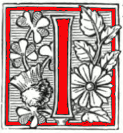[In the course of narrating the course of Robert Elsmere's loss of belief, Ward, writing more like an historian of late-Victorian religion than a novelist, sets forth the way members of various Christian denominations would react to German Higher Criticism's revelations about the date the Book of Daniel was written. — George P. Landow]

t was a change of conviction on the subject of the date and authorship of this strange product of Jewish patriotism in the second century before Christ that drove M. Renan out of the Church of Rome. 'For the Catholic Church to confess,' he says in his 'Souvenirs,' 'that Daniel is an apocryphal book of the time of the Maccabees, would be to confess that she had made a mistake; if she had made this mistake, she may have made others; she is no longer Divinely inspired.'
The Protestant, who is in truth more bound to the Book of Daniel than M. Renan, has various ways of getting over the difficulties raised against the supposed authorship of the book by modern criticism. Robert found all these ways enumerated in the brilliant and vigorous pages of the book before him.
In the first place, like the orthodox Saint-Sulpicien, the Protestant meets the critic with a flat non possumus. 'Your arguments are useless and irrelevant,' he says in effect. 'However plausible may be your objections the Book of Daniel is what it professes to be, because our Lord quoted it in such a manner as to distinctly recognize its authority. All-True and All-Knowing cannot have made a mistake, nor can He have expressly led His disciples to reward as genuine and Divine, prophecies which were in truth the inventions of an ingenious romancer.'
But the liberal Anglican—the man, that is to say, whose logical sense is inferior to his sense of literary probabilities—proceeds quite differently.
'Your arguments are perfectly just,' he says to the critic; 'the book is a patriotic fraud, of no value except to the historian of literature. But how do you know that our Lord quoted it as true in the strictest sense? In fact He quoted it as literature, as a Greek might have quoted Homer, as an Englishman might quote Shakespeare.'
And many a harassed Churchman takes refuge forthwith in the new explanation. It is very difficult, no doubt, to make the passages in the Gospels agree with it, but at the bottom of his mind there is a saving silent scorn for the old theories of inspiration. He admits to himself that probably Christ was not correctly reported in the matter.
Then appears the critic, having no interests to serve, no parti pris to defend, and states the matter calmly, dispassionately, as it appears to him. 'No reasonable man,' says the ablest German exponent of the Book of Daniel, 'can doubt that this most interesting piece of writing belongs to the year 169 or 170 B.C. It was written to stir up the courage and patriotism of the Jews, weighed down by the persecutions of Antiochus Epiphanes. It had enormous vogue. It inaugurated a new Apocalyptic literature. And clearly the youth of Jesus of Nazareth was vitally influenced by it. It entered into his thought, it helped to shape his career.'
Related Material
Sources
Ward, Mrs. Humphry. Robert Elsemere. Ed. Clyde de L. Ryals. Lincoln: University of Nebraska Press, 1967.
Ward, Mrs. Humphry. Robert Elsemere. Boston: DeWolfe, Fiske & Co., n.d. Project Gutenberg E-Book produced by Andrew Templeton and David Widger. Last Updated: February 7, 2013. Web. 20 July 2014.
Last modified 25 July 2014